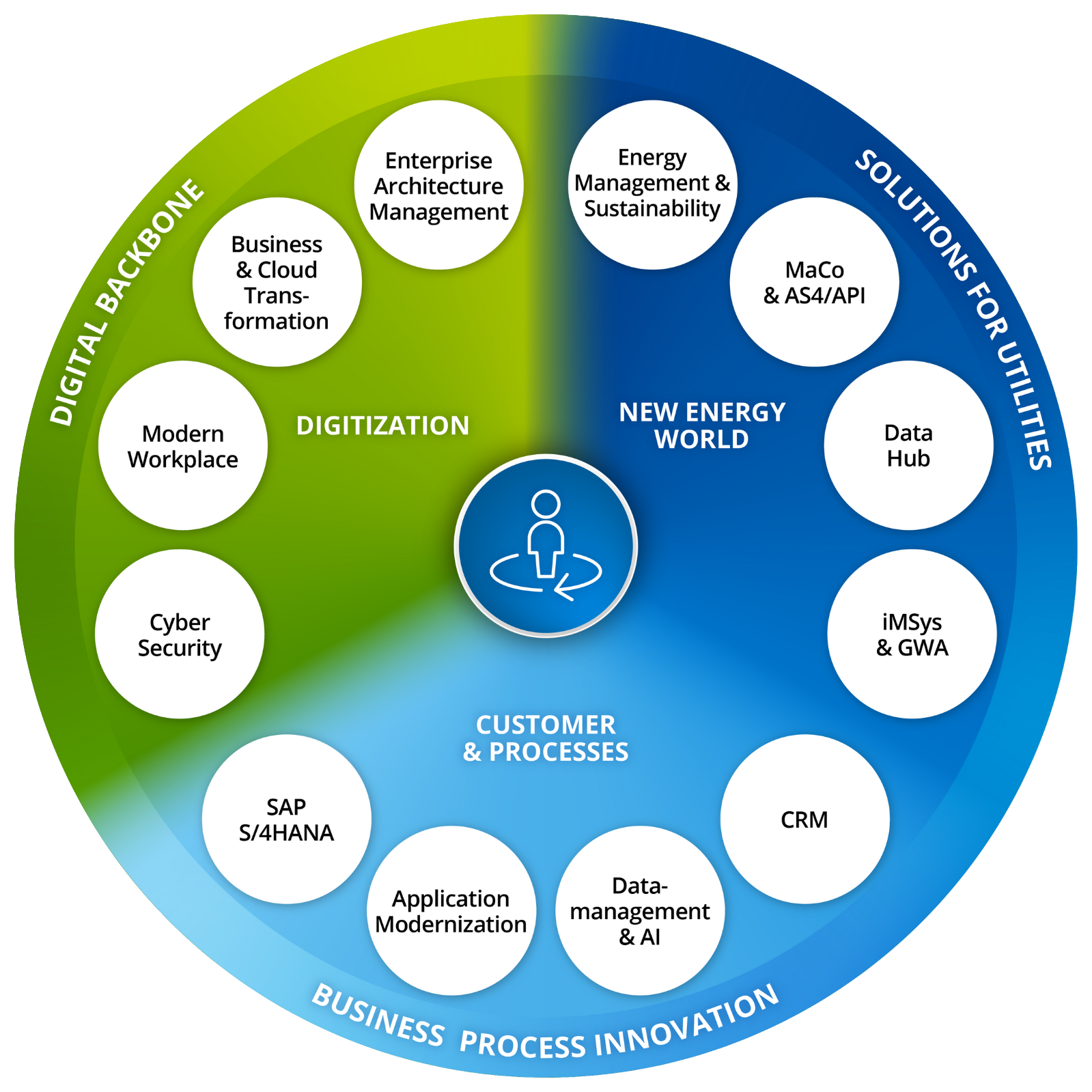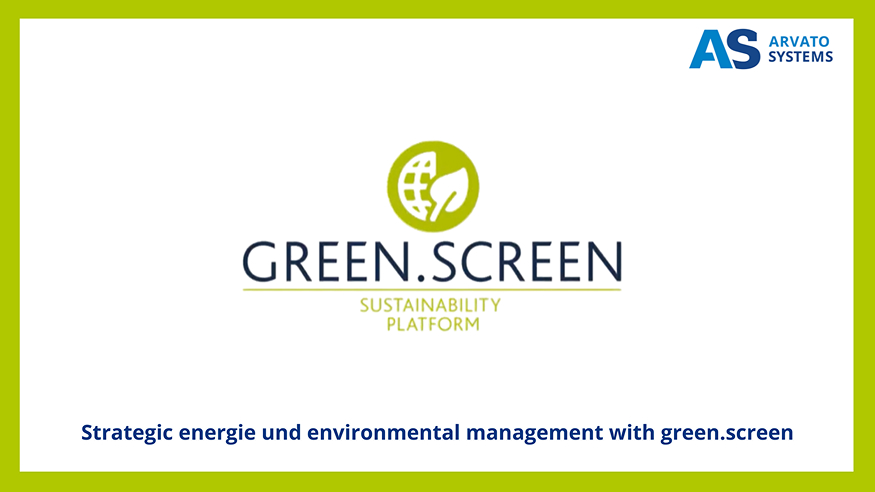
Driving Force for the Digitization of the Energy Industry
Simplification, Efficiency and Security through Digital Solutions
Pioneers Instead of Laggards: Driving Force for Digitization
It all depends on the right attitude. The energy transition should not be seen as an obligation to bow to the pressure of digitization but as an opportunity to develop new business models in the diversifying energy market. Successful energy suppliers make good use of the potential of digitization and important data resource. Efficient and secure IT systems help energy suppliers provide personalized offers and services, sustainably improve customer loyalty, and permanently increase competitiveness. With complimentary consulting services for the energy industry, our experts develop the necessary IT strategies, processes, and business models.
We make the digital energy world easier, more efficient, and safer and our customers more successful.


Our modular solution portfolio supports the use of digital potential and strengthens your competitiveness. Concentrate on your core business while we secure your digital foundation with cybersecurity and infrastructure operations. Meet customer and process requirements with business process innovations and lay the foundation for new service and product ideas. Trust us as a partner with industry and IT expertise to confidently meet regulatory requirements in the new energy world.

As a leading network operator and shaper of the energy transition, we are fully committed to the agile and digital transformation of our IT. Arvato Systems accompanies us on this journey as a strategic partner.
Worth Knowing
-
How does compliant market communication work using AS4 and Smart Meter PKI?
Applicability Statement 4 (AS4) is a messaging protocol used for the secure exchange of data and documents between market partners. It is based on web services and uses both digital signatures and encryption to increase the security of the exchanged data. By 01.10.2023, market communication electricity is to be operational via the secure AS4 process for market communication. From 31.03.2024, market communication between sender and recipient for the GPKE, MPES, WiM and MaBiS processes will then take place exclusively using the AS4 message protocol. Until then, electronic market communication must be protected by using the BSI's smart metering PKI (Public Key Infrastructure).
-
How is ESG-compliant reporting ensured?
Three letters stand for a lot: ESG. Environment, Social, and Governance - these are the three pillars on which a sustainable company should be built. Anyone who achieves good results in these areas is considered "ESG-compliant." But how is this measured? External organizations rate companies based on a score that reflects the implementation of ESG criteria and a company's performance and risk. Similar to a credit or bond rating. To be ESG compliant in the future, companies must be able to provide accurate and consistent information about their ESG data. And that's where our sustainability management software, green.screen comes in. With our cloud-based IoT environmental data platform, companies can collect, calculate, monitor, and document all energy and resource consumption company-wide. The transparency gained enables optimization and, thus, carbon footprint reduction. And best of all: green.screen can be seamlessly integrated into existing software systems.
-
How can an application landscape be transformed as part of a cloud journey?
Digital transformation presents utilities with a significant challenge: their application landscape, which has evolved over many years. To migrate successfully to the cloud, deciding which path is best for each application is essential. However, a purely technology-based analysis is not sufficient here. Instead, all applications must be considered and evaluated in detail, considering dozens of individual criteria in complexity, value, strategy, and regulations.
A proven approach is to analyze the cloud potential of each application in terms of infrastructure, technology, architecture, data, and dependencies. On this basis, an individual recommendation for the appropriate migration procedure will be made. As a result, utilities are supported in successfully bringing their application landscape to the cloud, thus paving the way for a successful digital transformation.
-
How do CRITIS companies protect themselves against cyber attacks?
Since May 1, 2023, operators of critical infrastructures - such as electricity and gas network operators - have been explicitly required to implement technical and organizational security measures for attack detection. The systems must be able to detect anomalies at an early stage during operation by means of pattern recognition so that potential serious damage can be averted.
IT organizations have different approaches to implementing cyber security. Some rely on pattern recognition at the operational technology level to meet regulatory requirements. This method is sufficient in the network operator's SCADA system, for example. Other vendors, however, recommend the use of a comprehensive Security Information and Event Management tool that serves as a Big Data platform for cyber security.
-
How can energy suppliers offer their customers flexible tariffs and bill them?
In the course of the energy transition, electricity generation is increasingly realized by wind and solar energy. However, these technologies are highly dependent on weather conditions and rarely supply constant amounts of electricity like conventional power plants. However, to ensure the security of supply of the energy grid, the same amount of energy must always be available and consumed. If, for example, a lot of energy is fed in due to renewable generation on the one hand, consumption must be adjusted on the other. Energy suppliers must therefore create incentives to control consumption. Usually, this happens via the price. Therefore, flexible tariffs are offered to encourage consumers to use electricity in times of high supply and low price. At the same time, consumption is to be reduced in times of low supply and high price.
The basic prerequisite for the introduction of flexible tariffs is the possibility of billing consumption on an hourly basis via intelligent electricity meters, the so-called smart meters.
More about Variable Tariffs -
Which ERP systems are the best for utilities companies?
Modern ERP systems offer the best conditions for utilities to map their business processes optimally. However, investments in digitization need to be carefully considered. In addition to proven products such as SAP S/4 HANA for Utilities, there are other attractive alternatives. With vendor-independent consulting, benefit-oriented methods and transparent criteria can guide you through the ERP selection process.
-
What impact will the MsbG amendment 2023 have on the energy industry?
With the Act to Restart the Digitization of the Energy Transition, the German government has sent a clear signal about the accelerated transformation of the energy supply. The law aims to accelerate the rollout of smart metering systems while reducing bureaucratic procedures and strengthening legal certainty. In addition, costs are to be distributed relatively and future-proof to stimulate the market and competition and bundle competencies in a targeted way. The law also intends to regulate an additional contribution to sustainability by better-supporting data on generation, consumption, and grid status and enabling dynamic electricity tariffs.
Certifications
Rely on us: information security, quality management, IT service management. For our customers, we regularly have our performance measured and extensively certified. You benefit in the long term from our adherence to the highest quality standards and our technological expertise in the form of a trusting and highly professional collaboration.
Your Contact for Utilities


































